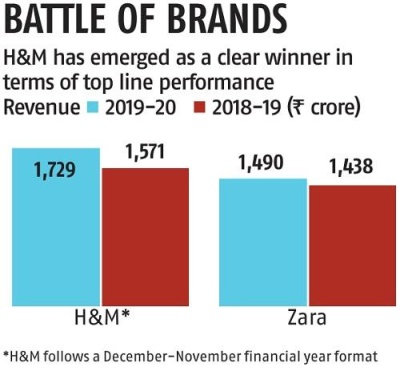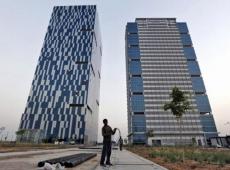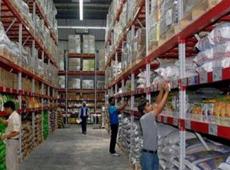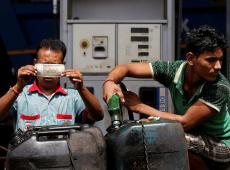Retail Jobs Surge in Smaller Cities: Top Brands Expanding Footprint
By Rediff Money Desk, Mumbai May 15, 2024 18:19
Top brands are expanding into smaller cities, creating retail jobs and opportunities for local talent. Experts anticipate a significant increase in job creation in the coming years.

Photograph: Kind courtesy H&M/Facebook
Mumbai, May 15 (PTI) As many top brands, both domestic and global, are expanding their footprint deeper into the country, industry experts believe it is likely to create a surge in job opportunities in the retail sector in smaller cities.
Experts also mentioned that there is a significant pool of untapped talent ready to cater to retail expansion in smaller cities.
"We anticipate around 25,000-30,000 permanent and temporary jobs to be created in the retail sector over the next 12-18 months, and this number will grow incrementally on an annual basis. Interestingly, there has been an increasing demand for retail jobs with around an 18-20 per cent uptick in job applications over the last 12 months," Randstad India Director, Professional Talent Solutions, Sanjay Shetty told PTI.
Moreover, he said, with the entry of major domestic and international retail brands including apparel, F&B, FMCG, among others into tier-II and III cities, there is a growing appeal for non-metro areas amongst retailers, indicating a substantial potential for employment generation in these regions.
"With companies increasingly setting up operations in smaller tier II and III cities, there is a significant pool of untapped talent ready to cater to retail expansion. Previously, most retail jobs were concentrated in metros, leading to the migration of talent from tier II and III cities in search of employment opportunities," Shetty said.
As retail developments flourish and domestic and international brands expand their footprint in non-metro cities, there is a growing emphasis on skill development and training programs to harness local talent effectively, he stated.
"This shift not only reduces the strain on metro cities but also fosters economic growth and development in tier II and III cities by providing employment opportunities closer to home for the local populace. This will also lead to talent relocating to their hometowns, thus being able to enjoy both personal and financial benefits, as the cost of living is often significantly lower in these smaller cities," he added.
TeamLease Services VP and Business Head at Staffing Balasubramanian A said, the retail sector accounts for about 10 per cent of India's GDP and 8 per cent of its workforce (6 crore).
"The overall job creation is expected to be another 4 crore in the next 10 years, and given that e-commerce is expected to grow at a faster pace, it's expected to contribute a significant portion of the incremental job creation. Crucially, the next decade would also mark the period when rural consumption exceeds the 50 per cent mark for the first time. Hence, tier II and III cities will account for the lion's share of incremental job creation in retail," he noted.
However, he said, even as reverse migration is a possibility, the pull of higher salaries in metros might still be strong.
"Improved job opportunities and a better quality of life in smaller cities could incentivise some to move back. However, our internal data suggests that salaries in smaller cities are anywhere between 10-30 per cent lower than in metros. While this gap is expected to come down, it's unlikely to reach parity in the foreseeable future," he added.
CIEL HR Services MD and CEO Aditya Narayan Mishra said that during the pandemic, many people migrated to their hometowns and realised how the cost of living there is much less when compared to metro cities.
The mindset of people has changed during that phase and people have become more open to moving and working in tier II and III cities, he said adding that this will also benefit the fresh graduates situated in smaller locations.
"Due to the increased job prospects, lower living expenses, and a desire for improved work-life balance, individuals may find themselves drawn back to their hometowns if they find good job prospects," Mishra added.
While there is a notable difference between salaries in tier I and II cities as the cost-of-living there is quite low compared to bigger cities, he said adding that "retail brands might analyse and offer competitive compensation packages customised to local market conditions to attract and retain top talent".
Further, Mishra noted that inadequate public transport infrastructure in smaller cities may present challenges for women looking to join the workforce.
"However, with the potential migration of companies to tier II and III locations, transportation options are expected to increase, potentially alleviating this barrier. To overcome these challenges, retail brands should prioritise inclusivity by implementing flexible work arrangements and offering transportation incentives," he added.
Experts also mentioned that there is a significant pool of untapped talent ready to cater to retail expansion in smaller cities.
"We anticipate around 25,000-30,000 permanent and temporary jobs to be created in the retail sector over the next 12-18 months, and this number will grow incrementally on an annual basis. Interestingly, there has been an increasing demand for retail jobs with around an 18-20 per cent uptick in job applications over the last 12 months," Randstad India Director, Professional Talent Solutions, Sanjay Shetty told PTI.
Moreover, he said, with the entry of major domestic and international retail brands including apparel, F&B, FMCG, among others into tier-II and III cities, there is a growing appeal for non-metro areas amongst retailers, indicating a substantial potential for employment generation in these regions.
"With companies increasingly setting up operations in smaller tier II and III cities, there is a significant pool of untapped talent ready to cater to retail expansion. Previously, most retail jobs were concentrated in metros, leading to the migration of talent from tier II and III cities in search of employment opportunities," Shetty said.
As retail developments flourish and domestic and international brands expand their footprint in non-metro cities, there is a growing emphasis on skill development and training programs to harness local talent effectively, he stated.
"This shift not only reduces the strain on metro cities but also fosters economic growth and development in tier II and III cities by providing employment opportunities closer to home for the local populace. This will also lead to talent relocating to their hometowns, thus being able to enjoy both personal and financial benefits, as the cost of living is often significantly lower in these smaller cities," he added.
TeamLease Services VP and Business Head at Staffing Balasubramanian A said, the retail sector accounts for about 10 per cent of India's GDP and 8 per cent of its workforce (6 crore).
"The overall job creation is expected to be another 4 crore in the next 10 years, and given that e-commerce is expected to grow at a faster pace, it's expected to contribute a significant portion of the incremental job creation. Crucially, the next decade would also mark the period when rural consumption exceeds the 50 per cent mark for the first time. Hence, tier II and III cities will account for the lion's share of incremental job creation in retail," he noted.
However, he said, even as reverse migration is a possibility, the pull of higher salaries in metros might still be strong.
"Improved job opportunities and a better quality of life in smaller cities could incentivise some to move back. However, our internal data suggests that salaries in smaller cities are anywhere between 10-30 per cent lower than in metros. While this gap is expected to come down, it's unlikely to reach parity in the foreseeable future," he added.
CIEL HR Services MD and CEO Aditya Narayan Mishra said that during the pandemic, many people migrated to their hometowns and realised how the cost of living there is much less when compared to metro cities.
The mindset of people has changed during that phase and people have become more open to moving and working in tier II and III cities, he said adding that this will also benefit the fresh graduates situated in smaller locations.
"Due to the increased job prospects, lower living expenses, and a desire for improved work-life balance, individuals may find themselves drawn back to their hometowns if they find good job prospects," Mishra added.
While there is a notable difference between salaries in tier I and II cities as the cost-of-living there is quite low compared to bigger cities, he said adding that "retail brands might analyse and offer competitive compensation packages customised to local market conditions to attract and retain top talent".
Further, Mishra noted that inadequate public transport infrastructure in smaller cities may present challenges for women looking to join the workforce.
"However, with the potential migration of companies to tier II and III locations, transportation options are expected to increase, potentially alleviating this barrier. To overcome these challenges, retail brands should prioritise inclusivity by implementing flexible work arrangements and offering transportation incentives," he added.
Source: PTI
DISCLAIMER - This article is from a syndicated feed. The original source is responsible for accuracy, views & content ownership. Views expressed may not reflect those of rediff.com India Limited.
You May Like To Read
TODAY'S MOST TRADED COMPANIES
- Company Name
- Price
- Volume
- GTL Infrastructure
- 2.93 ( -4.87)
- 226206286
- IFL Enterprises
- 1.30 (+ 4.84)
- 81461564
- Vodafone Idea L
- 16.79 (+ 0.66)
- 67447398
- NCL Research
- 0.95 ( -4.04)
- 31996628
- Franklin Industries
- 3.73 (+ 3.32)
- 21511209
MORE NEWS

Navi Mumbai Airport ILS Signal Testing Begins
The Airports Authority of India (AAI) has begun ILS signal testing at the...

Air India VRS for Non-Flying Staff Ahead of...
Air India has announced a voluntary retirement scheme (VRS) and voluntary separation...
Fisher Groups Oppose WTO Fisheries Subsidy Talks
Small-scale fisher groups from India, Indonesia, and Bangladesh demand WTO keep...












 © 2024 Rediff.com India Limited. All rights reserved.
© 2024 Rediff.com India Limited. All rights reserved.